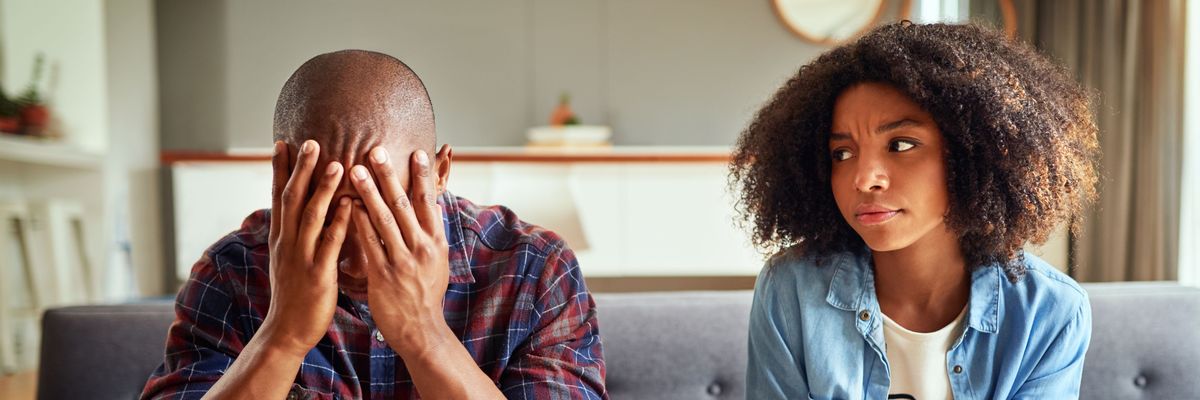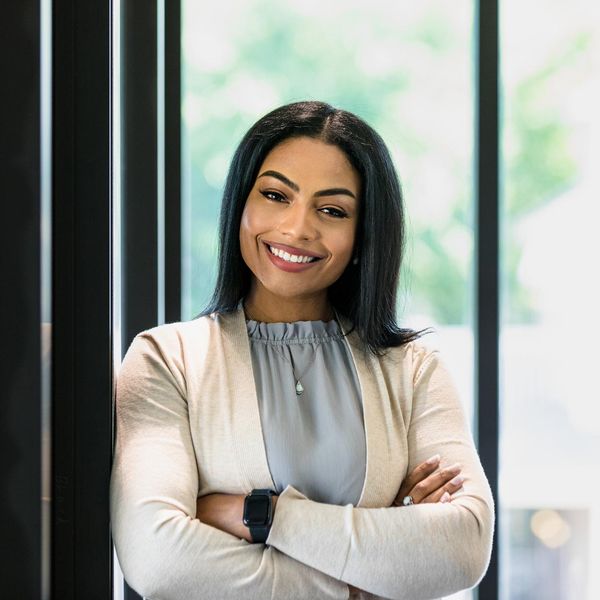
Early last year, I visited a girlfriend that I have known for quite some time. For the purpose of anonymity, we will call her "L." At the time we met, I was a legal assistant studying for my master’s degree and she was attending law school. “L” and I both graduated from our respective schools around the same time. She started her career as an insurance defense lawyer and I was so happy for her. But “L'"s journey to becoming a lawyer wasn’t an easy one. Like most law school graduates, passing the bar exam is one of the biggest challenges.
One summer morning, “L” texted me and said, “Hey Cam, I just wanted to let you know I didn’t pass the bar.” I replied, “It’s OK. You’ll pass on the next try.” And she did pass on her third try. Coming from similar Caribbean backgrounds, I know the pressure of meeting expectations, being an overachiever, and being placed on a pedestal. I understood because at one point in my life I had wanted to be a lawyer too.
That afternoon we met for lunch. Our conversations are always filled with transparency, love, charisma, and laughter. This particular afternoon, there came a point in the conversation where “L” wholeheartedly revealed to me her daily struggles with ADHD (Attention Deficit Hyperactivity Disorder). And I wanted to know more. It was the first time I heard of a woman with ADHD. Let alone a Black woman.
“L” had hidden her struggle so well. I had no idea how it affected her life.
As a friend, I thought, what could I have done to help or be more supportive. The saying is true – you never know what someone is going through. And today, I am proud of how “L” prioritized herself, took control of her life, and not be defeated by her condition.
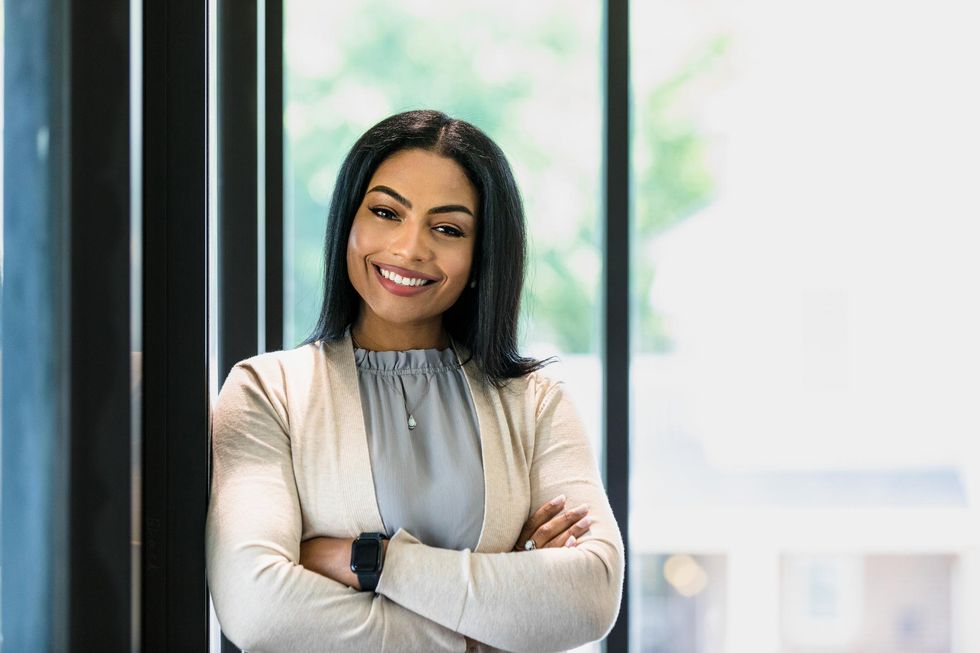
Getty Images
Oftentimes, the diagnosis of ADHD in Black women is misdiagnosed and overlooked. According to The Washington Post, “Black girls with ADHD often remain undiagnosed because their symptoms are mischaracterized. Signs of inattentiveness or impulsivity, the two main features of the disorder, could be mistaken for laziness or defiance. And the longer these girls aren’t diagnosed and treated, the more their problems are likely to worsen as they grow into adults.” The article also states that ADHD in girls leads to increased rates of anxiety, depression, drug use, and self-harm.
From a cultural perspective, it is even harder for Black parents to accept that their child has a learning disability with having to protect their child from gender and racial biases not only in the classroom but in life too. In a review of published U.S. studies that included 155,000 Black children, the CDC (Center For Disease Control) found 14.5% of African-Americans had ADHD. This statistic is much higher compared to the estimated 9.4% of all children in the U.S.
In an article by Verywell Mind, the most common symptoms of ADHD in women are paper clutter, overspending, disorganization, indecision, problems listening, and difficulty focusing. Treatment for ADHD includes prescribed medication and/or behavioral therapy. Drugs like Ritalin or Adderall are commonly used to help ADHD patients stay focused and control their behavior. But it doesn’t come without side effects. Some downfalls of ADHD medication are trouble sleeping, loss of appetite, high blood pressure, weight loss, moodiness, and headaches.
There is hope to manage ADHD. Celebrities such as Solange Knowles or SZA have struggled and are successfully navigating life with ADHD. Even Simone Biles has publicly discussed her own battle with ADHD while balancing a demanding career as a professional athlete.
Here is what it is like for “L," a young Black woman, to live with ADHD, balance a demanding career as a lawyer, and succeed in everyday life.
How old were you when you were diagnosed with ADHD?
I was officially diagnosed at about 15 years old. It went undiagnosed due to prior trauma. However, my parents had me in therapy here and there when they could afford it. I was always a hyperactive child who would always get in trouble because I couldn't sit still or keep my mouth shut. I got a lot of "feedback" for being random in my actions and through my words.
What were some of the signs that you were struggling with ADHD and how did it make you feel?
The obvious sign for me was the fact that I was behind in my academics and kids used to always refer to me as "crazy" because of how random I was. I could not focus like my peers. I was always in and out of therapy for other reasons. It was always suggested I should be on medication. I didn't even know what ADHD was until I was about 16 years old as my parents did not believe in medication or this new-age diagnosis.
My parents had me in every tutoring program imaginable in order for me to keep up with my fellow classmates. I got my ears and eyes tested before I went to a psychiatrist to get a test for ADHD.
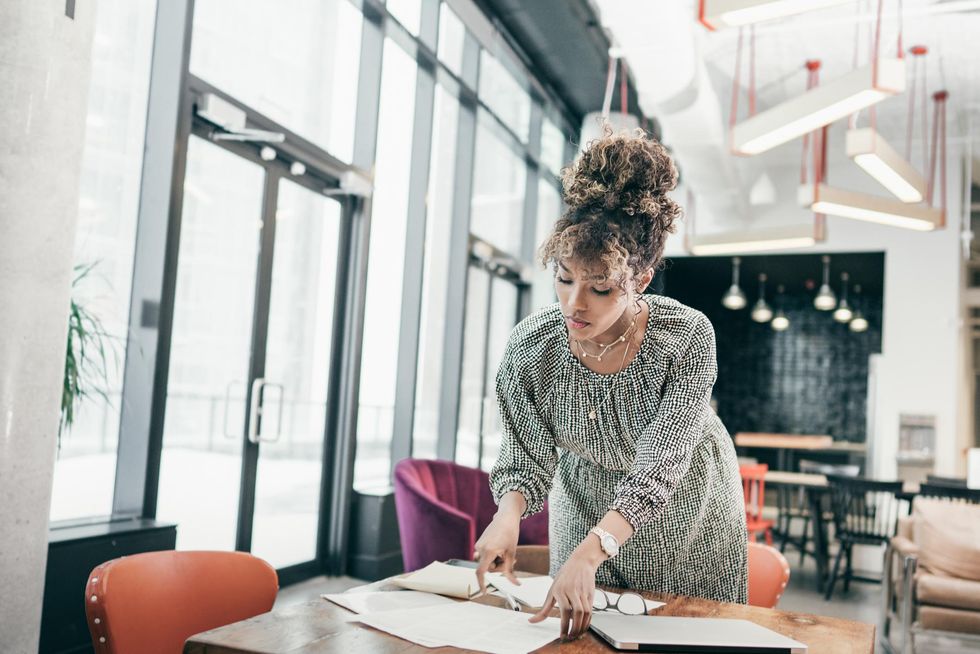
Getty Images
Ritalin or Adderall is usually prescribed for many ADHD patients. Is prescribed medication something you have used to treat your ADHD? If not, what are some natural remedies you have tried?
Yes, I've tried Ritalin (when I was a teenager) and as I got older, I graduated to Adderall, as well as Concerta. I've also tried hypnotherapy and talk therapy. The thing about prescription medicine they won't tell you is that it works, but you have to gradually increase the dosage as your body becomes used to it. I would sometimes come off the medication because I hate being dependent on a drug to function. I would feel really depressed and tired.
How did you get through law school and what were some of the challenges?
By the grace of God and really great friends. I had to learn early on in life to make friends with people smarter than me in order to stay motivated and just to keep up. I would also cycle on and off medication in law school in order to cope. I went a semester without any prescription drugs, just to see if I could do it on my own. Yes, I could do it on my own, but it was very difficult. I had constant anxiety, could not sleep, mild depression, and spiraled.
Now that you are a career lawyer, what are some challenges you face at work?
Every day is a new challenge. My biggest challenge is working. Literally sitting my ass down to work, especially after the pandemic. I had to learn quickly to create a new routine. Having a high caseload as a civil litigation attorney helps as I am always busy so I have no time to procrastinate as much. The organized chaos of heading to court in the morning, working on drafting motions and pleadings for cases in the afternoon, responding to emails, and settling cases throughout the day were no longer serving me. Organization and structure are my biggest challenges. I get distracted easily and fall into these "wormholes" and never finish my assignments. So, I'm always having to work late to play catch up. I had to create realistic structures that worked for me.
For example, time blocking or working on alternating weekends and/or late nights to stay ahead of my tasks to not overwhelm me. Working for a solid law firm that has systems and teams in place to complement my own systems is imperative. I've cycled through many firms (big and small). So, I know what works and what doesn't. Working with the right people matters and is often overlooked. Having a good case management system along with excellent support staff (paralegals or assistants) is how I am able to succeed.
"Organization and structure are my biggest challenges. I get distracted easily and fall into these 'wormholes' and never finish my assignments. So, I'm always having to work late to play catch up. I had to create realistic structures that worked for me."
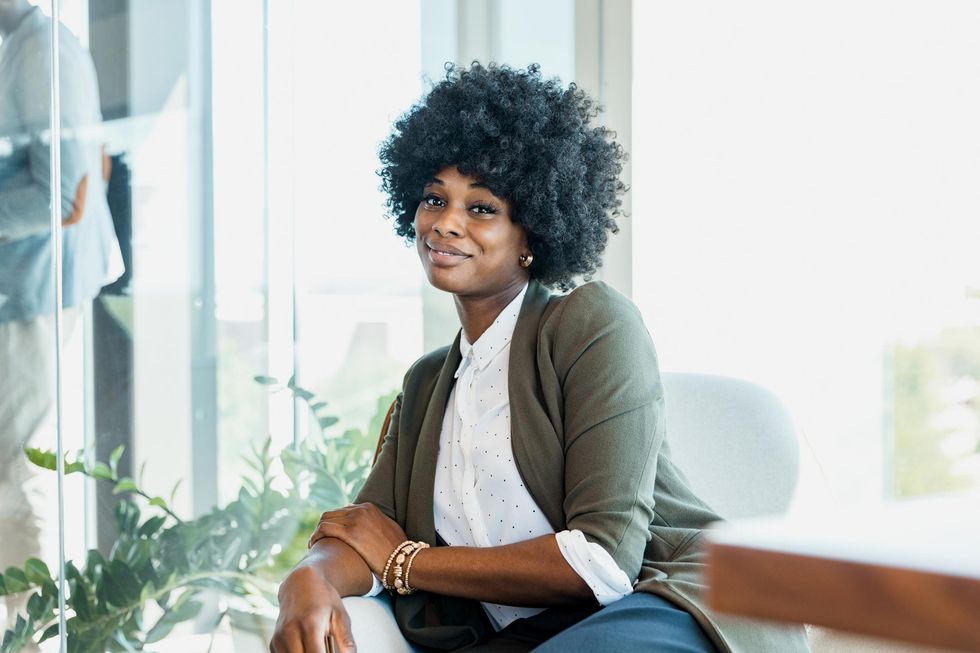
Getty Images
How have you adjusted your routine because of your ADHD? What does your morning and nighttime routine look like?
Yes, having a routine is imperative. I've had to shift my mindset through many therapy sessions. Having been a burnt-out lawyer, my mornings look a bit different now. I'm no longer competing to be the best and striving for perfection. I'm not trying to prove myself anymore because I know what I bring to the table. I show up, do my best on that particular day, and don't dwell on my mistakes.
8:00 a.m.: I start my mornings with a prayer, then I check my phone for any work emergencies or changes to my schedule. I will communicate with my assistant on what's important and what needs to be done.
8:10 a.m.: I lay in bed, contemplate life, and make my intentions for the day.
8:20 a.m.: I literally jump out of bed, (work is supposed to start at 8:30 am.) and make my bed. I love making my bed because it feels like such an accomplishment to me. I always say that if I don't accomplish anything for the day, at least I made my bed.
8:25 a.m.: I log on to my computer for work to test the waters. Thereafter, I brush my teeth, wash my face, shower, brush my hair, and put clothes on. I do all this while arguing with Alexa about music selection. Pro Tip: I set timers while I'm in the bathroom with Alexa (5 min. - snooze; 10 min. - snooze; 15 min. - snooze) to stay on track.
8:45-9:00 a.m.: I'm logged in to work for real-for real with my first cup of coffee of the day.
I immediately check the deadlines on my calendar, prioritize tasks and/or cases then attack them in segments with multiple breaks in between. I like to do the same tasks during blocks of time (reviewing case files and drafting a case plan, emails, client conference calls, etc.). Through trial and error, I have learned that I work more efficiently when I'm doing the same tasks over and over again.
On days where I have court hearings, depositions, mediations, client calls, or any event, my days look very different. I wake up earlier to hand-write a script of what I plan on saying. I do this to calm my nerves and to stay focused on the task at hand as to not go off on tangents. No matter how many times I've made the same speech or argument - this is what works for me.
6:30 - 7:00 p.m.: I'm logged out and head to the gym for a Zoom training session with my trainer. I try to work out at least 3-4 times a week with a trainer. Even if I do 10 haphazard jumping jacks, any sort of physical activity helps to maintain my routine and makes me feel good. I have coworkers who work out during lunchtime.
Personally, I can't do that because it's hard for my brain to switch gears after a workout and get back into work mode. I highly recommend doing physical activity early in the morning prior to work. It really sets the tone for the workday.
Does ADHD affect your mental health? If so, how?
Yes, in many ways and often. There are many internal battles of self-doubt, not doing enough work, being slower at a task than others, or lingering feelings of unworthiness. I have days where my head is so cloudy that it takes me hours to do a task which usually takes me about 15 minutes. On days like that, I have to mindfully give myself grace for my own sanity because beating myself up won't make a difference.
I remember times where my ADHD got so bad that I was feeling defeated, depressed, and became physically sick from the stress which also caused crippling anxiety. As a child, I remember I used to breathe at a rapid rate which they thought was asthma-related. Come to find out later to find out it was anxiety. I was given an inhaler to help. I still have days where I'm literally spinning in circles from task A to B then to A again, only to start a new task, D, then remember task C, only to realize A, B, C, and D are all incomplete and unnecessary tasks.
"I have days where my head is so cloudy that it takes me hours to do a task which usually takes me about 15 minutes. On days like that, I have to mindfully give myself grace for my own sanity because beating myself up won't make a difference."
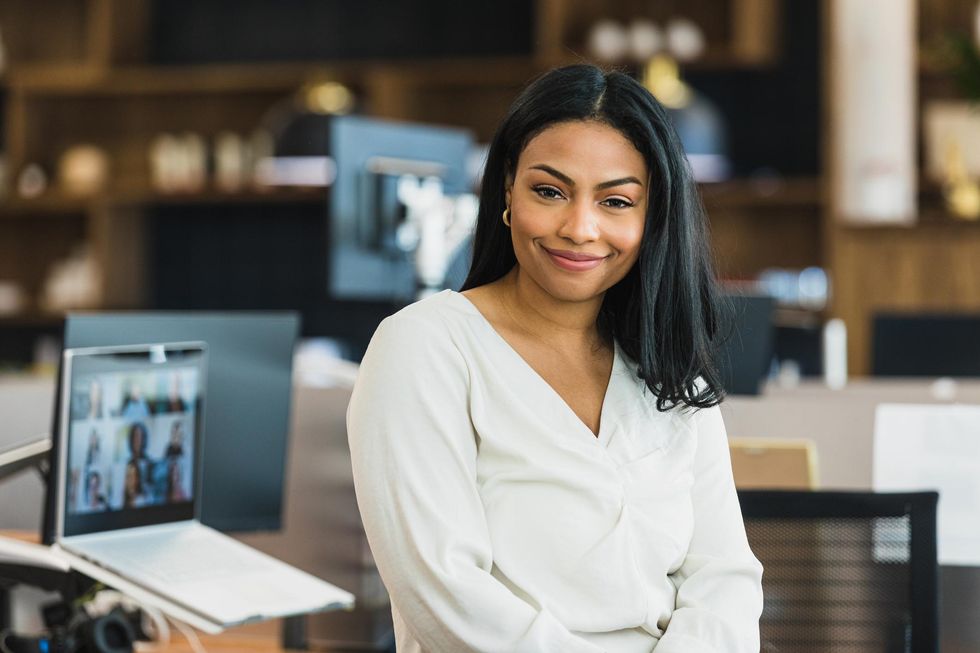
Getty Images
What would you tell other women who are struggling with ADHD, mental health issues, and a demanding career?
Give yourself grace, lots and lots of grace, and seek professional help. Find what works for you. I'm still trying to figure it out, but therapy has transformed my way of thinking and my life. It has helped me to re-evaluate my life, career, and plan a more sustainable life/work balance. Life first, work second.
If you’re a Black woman struggling with ADHD, you are not alone and it doesn’t have to be just your secret anymore. It’s nothing to be ashamed of either. There are many women of color with ADHD and other learning difficulties and/or disabilities. And it doesn’t mean you are less of a person because of it. It means your journey looks different than most women of color. There is just an extra layer you’ll have to manage. And that is OK.
You have to give yourself grace and permission to accept your diagnosis and find ways to cope. Unfortunately, we live in a society with so many stigmas that we constantly neglect root causes. If you are looking for support, check out Black Girl, Lost Keys, or Unicorn Squad, For Black people of Marginalized Gender with ADHD, a blog, and a private Facebook group by Rene Brooks. Having ADHD herself, Rene Brooks helps educate and empower other Black women who have ADHD.
You can start your healing now.
Featured image by Getty Images
- How Black Women Are Putting Their Mental Health First - xoNecole ... ›
- Black Boy Joy: How A Mom And Son Turned Trauma Into Advocacy ... ›
- SZA Opens Up About Dealing With ADHD: 'I Be Ready To Tap Out ... ›
- How ADHD Affects Romantic Relationships - xoNecole: Women's Interest, Love, Wellness, Beauty ›
- How ADHD Affects Romantic Relationships - xoNecole: Women's Interest, Love, Wellness, Beauty ›
This Is How To Keep 'Holiday Season Stress' From Infecting Your Relationship
Hmph. Maybe it’s just me, but it seems like there is something really weird happening in the fall season air (because winter doesn’t officially begin until December 21) that cuddle season is in full swing while break-up season is as well. In fact, did you know that break-ups are so popular during the holiday season that December 11 is deemed Break-Up Day?
The reasons why relationships shift around this time vary; however, I did both roll my eyes and chuckle when I read that a very popular one is because it’s an easy way to get out of getting one’s significant other a Christmas present. SMDH.
Anyway, I personally think that the less shallow folks out here may contemplate calling things “quits” or they at least distance themselves a bit from their partner (and what I’m referring to is serious relationships) due to all of the stress and strain that oftentimes comes with the holidays whether it be financial, familial, due to their tight schedules or something else.
Listen, I would hate for you and your man to miss the fun and happiness of experiencing this time of year, all because you are so overwhelmed or irritated that you can’t really enjoy it. That’s why I have a few practical tips for how to avoid allowing the typical holiday season stress from INFECTING your relationship.
Manage Your Expectations
 Giphy
GiphyUnmanaged expectations. If there is a main reason why the holiday season tends to be so stress-filled for so many people, I’d bet good money that this is the cause. And when you’re in a long-term relationship, expectations can manifest themselves in all sorts of cryptic and/or unexpected ways. You might have relatives who assume that you are going to be with them for Thanksgiving or Christmas when you have other plans in mind. You might be thinking that you are going to spend one amount for presents while your man is thinking something totally different. When it comes to scheduling, your signals may be crossed.
And you know what? To all of these scenarios, this is where clear and consistent communication come in. Don’t assume anything. Don’t dictate anything either. From now until New Year’s, mutually decide to check in once a week, just to make sure that you are both on the same page as it relates to the holidays and what you both are thinking will come along with it. The less blindsided you both feel, the less stressed out you will be. Trust me on this.
Set (and Keep) a Budget
 Giphy
GiphyOkay, so I read that last year, 36 percent of Americans incurred some type of holiday-related debt. Hmph. Last year, there was still some sense of normalcy in this country, chile, so I can only imagine what finances are gonna look like over the next several weeks. That said, since I don’t know a lot of people who don’t find being broke stressful, make sure that you and your bae set a budget and then stick to it this year — no ifs, ands or buts.
Because really, y’all — it doesn’t make sense to deplete savings and/or max out credit cards for a few days of giggles only to be damn near losing your mind because you don’t know how to make ends meet come Dr. Martin Luther King, Jr. Day.
And by the way, this tip doesn’t just speak to things like food and gifts; I also mean travel. If it doesn’t make a ton of sense (or cents) to be all over the place this year — DON’T BE.
Keep Matthew 5:37 at the Forefront
 Giphy
GiphyIf off the top of your head, you don’t know what Matthew 5:37 says, no worries, here ya go: “But let your ‘Yes’ be ‘Yes,’ and your ‘No,’ ‘No.’ For whatever is more than these is from the evil one.” That verse right there? Oh, it’s a boundaries lifesaver! I say that because do you see “maybe” or “I’ll think about it” in there? Nope. LOL. It says that you should tell people “yes” or “no” and leave it at that — and that complements Anne Lamott’s quote, “’No’ is a complete sentence” impeccably well. Yeah, you’ve got to remember that anything beyond a yes or no to a request is privileged information; you don’t owe anyone details or an explanation.
Besides, if you are really honest with yourself, when someone asks you something and you give a “Umm, let me think about it” kind of reply, more times than not, you already know what your answer is going to be — so why not let you both off of the hook? Give your response. Commit to that. And let everyone (including yourself) get on with their lives and schedules.
I promise you that when it comes to those holiday parties, you are pissing more folks off by not RSVP’ing or doing so and not showing up than just saying, “Thank you but not this year” off the rip.
Remember That Your Personal Space Is Privilege Not a Right
 Giphy
GiphyA friend of mine recently bought a new house and invited me over to come see it. He’s a single man with no children, so as I was taking in all of the space that he had, especially as I walked through his finished basement, I joked about relatives coming to live with him. “Hell no” and “absolutely not” were pretty much his immediate responses as he went on to say that some folks even had the nerve to be offended when he told them that he had no intentions on taking DNA in.
Ain’t it wild how people think that your stuff is their right? And yes, that brings me to my next point. Your home is your sanctuary space. If you want to host folks this year — cool. If not, ALSO COOL. Please don’t let folks (family included) guilt you into how they want you to act or even into what they would do if the shoe was on the other foot. You are not them — and as one of my favorite quotes states, “If two people were exactly alike, one of them would be unnecessary.” (A man by the name Larry Dixon said that.)
Hell, my friends? They know that I am good for sending them random things that they need or even want all throughout the year. Coming over to hang out at my pace, though. Uh-uh. Chalk it up to being a card-carrying member of the ambivert club yet I like keeping my living space personal — and I sleep like a baby, each and every night, for feeling that way.
Always remember that your space, your time, your resources, your energy and shoot, yourself period (including your relationship), are all things that are your own. You get to choose how, when and why you want to share them. The holiday season is certainly no exception.
Cultivate Some “You Two Only” Traditions
 Giphy
GiphyIt’s not uncommon for some couples to hit me up after the holiday season to “detox.” Sometimes it’s due to the financial drama (and sometimes trauma) that they experienced. Sometimes it’s because they allowed their relatives (especially in-laws) to get more into their personal business than they should’ve. More than anything, though, it tends to be because they didn’t get enough quality time together and so ended up feeling “disconnected.”
Please don’t let that happen. Listen, I’m not even a holidays kind of woman and yet, I will absolutely sit myself down with some hot chocolate and chocolate chip cookies to enjoy a Hallmark holiday film or two. Aside from the fact that most of them are lighthearted and sweet, I also like that they usually focus on couples loving on each other amidst all of the holiday beauty and ambiance — which is something that all couples should set aside some time to do.
Maybe it’s a vacation. Maybe it’s a staycation. Or maybe it’s my personal favorite, A SEXCATION. Whether it’s for a few days, the weekend or even overnight — don’t you let the holidays go by without setting aside time for you and your man to celebrate one another. Don’t you dare (check out “Are You Ready To Have Some Very Merry 'Christmas Sex'?”).
GET. SOME. REST.
 Giphy
GiphyI once read that 8 out of 10 people get stressed out over the holidays and 3 out of 10 lose sleep during to it — and when you’re stress-filled and sleep-deprived, that can absolutely lead to hypersensitivity, making mountains out of molehills and even not being in the mood for sex.
Your relationship can’t afford to go through any of this, so definitely make sure to prioritize rest. I don’t care how unrealistic it might seem during this time, sleep should never be seen as a luxury; it will always and forever be a great necessity.
That said, try to get no less than six hours of shut-eye in (check out “6 Fascinating Ways Sex And Sleep Definitely Go Hand In Hand”) and even ask your bae to take a nap with you sometimes (check out “Wanna Have Some Next-Level Sex? Take A Nap, Sis.”). Not only will sleep help to restore your mind, body and spirit but, when it’s with your partner, it’s an act of intimacy that can make you both feel super connected, even in the midst of what might feel like chaos.
___
Holiday season stress is real. Still, never give it the permission or power to throw your relationship off. Put you and your man first and let the holidays be what they are gonna be, chile.
Let’s make things inbox official! Sign up for the xoNecole newsletter for love, wellness, career, and exclusive content delivered straight to your inbox.
Featured image by Shutterstock
“Late” is an interesting word. I say that because, based on the situation, being late can actually be subjective.
For instance, if you agree to show up somewhere at 11:30 a.m. and you pop in at 11:45 a.m., you are absolutely late. No wiggle room there. Yet when it comes to something like an apology? I mean, when you factor in a definition for late like “occurring, coming, or being after the usual or proper time” — how do you determine when the proper time should be? Is it supposed to be when you want to hear it, or when someone is ready to offer it and actually means the words behind it?
And that is why I decided to put emphasis on the word “late” for today’s topic. Because if you and someone break up and they approach you, well after the fact, with an “I’m sorry,” if you struggle with whether or not to accept it due to the timing of it all, you should definitely ponder that a bit.
And as you’re doing so, it might help to read a bit deeper into what an apology should look and live like, even from an ex, regardless of when it shows up.
Your “late.” Or his right on time.
Three Things That a True Apology Consists Of
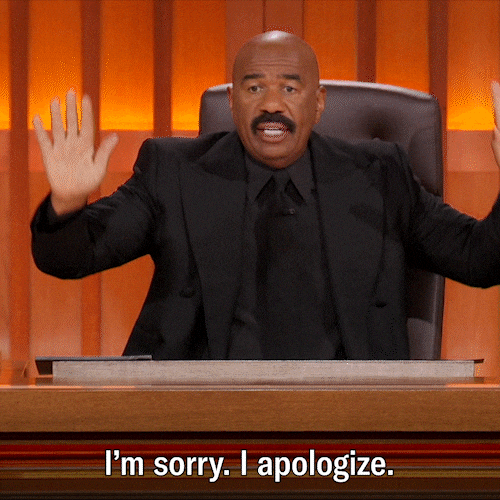 Giphy
GiphyIt’s kind of wild that when you work as a therapist/counselor/coach, a lot of people never really see you as human — and this can include your close relationships. What I mean by that is, it’s almost like they expect you to be free on-call therapy to the point where they “forget” to actually check on you sometimes.
Such is the case with one of my longest-running friendships. Even during the weeks between losing my mother and losing $4K (SMDH), she would just keep calling me to vent about her marriage. I finally got so fed up that I brought it to her attention that for the past couple of years, that is exactly what our friendship has been like: her venting, me listening without her being very invested in my life at all. In response, she texted me an apology — and boy, was it beautiful.
I’m not going to share the details of what she said; however, I am going to tell you three things that it consisted of because it’s what I believe ALL APOLOGIES should entail.
1. She took full ownership for what she believed that she did. I framed this point in this way because, something that everyone needs to forever keep in mind is the fact that two people start and, to a large extent, end relationships — and what I mean by that is, it’s never like one person was perfect and the other was the villain. That said, though, when someone is making an apology to another individual, they are going to own their part and articulate what that part is. It’s not gonna be a simple “My bad.”
It’s going to be “I am really sorry that I wasn’t there for you when you needed me” or “I apologize for taking you for granted” — something that sounds like they get the “offense” that transpired. By doing this, they recognize their missteps — and that is what puts people on the road to not repeating them.
2. She did not deflect or gaslight me. You know what one of the worst apologies are: It’s when someone says they are sorry and then follows it up with, “But you do it too” or “If you hadn’t done ‘A’, I wouldn’t have done ‘B.'” Justifying your actions is a surefire way to make someone believe that you don’t really think that you did something wrong (or that bad) in the first place. And really, how can they trust you (again) if that is how you feel? Oh, and don’t get me on gaslighting.
Ugh, ain’t nothing like someone claiming that they want to set things right with you, only to act like they don’t really get where you are coming from with the issues y’all were having in the first place. A good gaslight line in an apology: “If that is what you think happened, I apologize.” Yeah, you can keep that, jack. Never accept this kind of apology — because it isn’t one.
3. She addressed why she needed to make the apology in the first place. Wanna know one of the main reasons why I don’t trust people who don’t believe in having regrets (check out “Why Regret Might Not Always Be A Bad Thing”)? Did you know that apology means “a written or spoken expression of one's regret, remorse, or sorrow for having insulted, failed, injured, or wronged another.” How, as a human, do you think that you are out here not making any mistakes or poor decisions that you sometimes need to APOLOGIZE for? That is just…insane.
And one of the reasons why apologies are important is because if you feel bad about “failing” someone, it’s usually because you value them enough to want to keep them around. And yes, in my friend’s apology, she also explained why she didn’t want me to feel hurt in the way that she had hurt my feelings and what she would do to prevent that from happening in the first place.
So y’all, with all of this out of the way, before getting deeper into this topic? If an ex is hitting you up to apologize to you for something, please make sure that he hits all three marks of a true apology.
Now let’s keep going.
A Genuine Apology Should Also Include an Amends
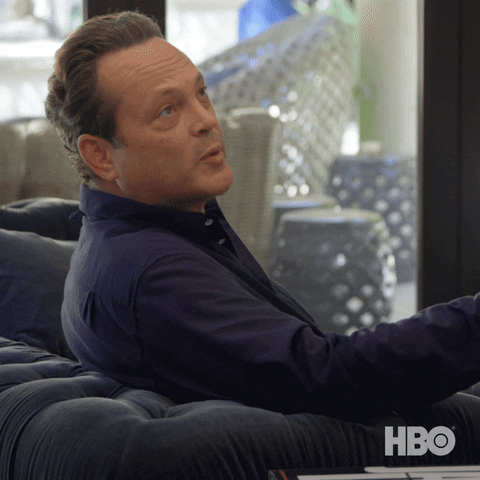 Giphy
GiphyA few years ago, I wrote an article for the platform entitled, “Heads Up: It's NOT An Apology If An Amends Isn't Made.” You know how I mentioned a second ago that a solid apology has no gaslighting in it? Hmph. Ain’t it wild how someone can do something that hurts or harms you and yet, they want you to just “hurry up and get over it”? GASLIGHTING.
Someone in my family, after unpacking years of abuse that I experienced at their hand, they had the nerve to say, “I’m not going to keep apologizing to you for this.” Hmm…Okay. So, how about you let me give you a consistent three months’ worth of the years of mistreatment that I experienced from you and then flippantly throw an apology your way. Let’s see how you feel about it. How much you believe that I am being genuine and sincere.
Listen — and please hear me GOOD on this: when someone really gets the magnitude of the pain or discomfort and inconvenience that they caused, they aren’t going to be fine with just saying that they are sorry for it; they are going to ask you what they can do to set things right.
It’s actually a part of the reason why I named the four children who I aborted (check out “Why I Named The Children I Aborted”) because I do have some real remorse for those decisions. Each of their names have an intentional meaning and I strive to leave out their purpose, through those names, on a daily basis. It’s a small way of making amends.
You know, back when my first book came out, my first love reached out, via email, to send me an apology. The apology hit most of the points that I mentioned earlier. Looking back, there wasn’t an offer to make an amends, though, and trust me, there was A LOT to make up for.
At the end of the day, amends means “reparation or compensation for a loss, damage, or injury of any kind; recompense” and while none of us should use bitterness, resentment or emotional stagnation as the “bar” for which we should expect amends to be made, if you’re trying to figure out just how sincere an ex is with their apology, if they want to do something to make things better, that’s a good sign.
There is a caveat, though.
Discern the Motives. Always.
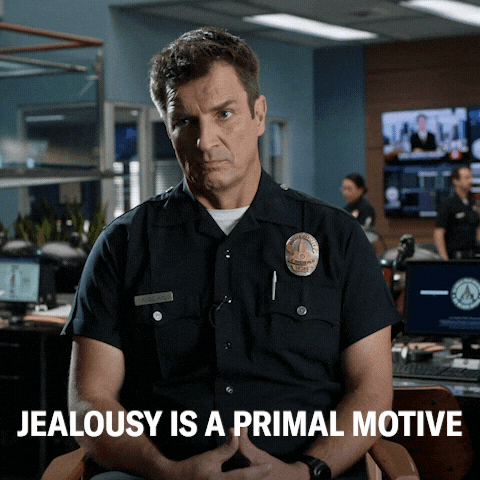 Giphy
GiphyEarlier this summer, I wrote an article for the platform entitled, “What's Your Motive For Sex? (It Reveals A Lot. Trust Me.)” Then, a few weeks ago, I wrote another article entitled, “As Cuffing Season Steadily Approaches, What The Heck Is 'Winter Coating'?” and boy, when I tell you that both of these complement this point really well? Goodness.
If you’ve never heard of the dating trend known as winter coating before, it’s basically when an ex creeps back up around cuffing season — and if you know what cuffing season is all about, you can absolutely connect the very probable motives behind those dots.
Now can there be exceptions? There are ALWAYS exceptions. Still, if you haven’t heard from your ex in years and here he comes a couple of weeks before Christmas, unless the two of you got together or broke up around the holidays, stay on potential “winter coating alert,” because it might not be about “building bridges” so much as getting into your bedroom.
That said, if it’s been a minute (six months or more) since you’ve heard from an ex and he suddenly reaches out to apologize, absolutely take out a moment to discern the motive — and shoot, feel fine with even asking what is causing him to make the move…now. If it’s in the spirit of the holidays and wanting to go into a new year with a clean slate, got it. If it’s because he’s been in therapy and realizes that he didn’t end certain things in his past very well, understood. If it’s because he didn’t like how the two of you broke up and he wants to try and make peace, that’s fair.
On the other hand, if you sense that he wants to rekindle something (check out “Nelly And Ashanti Are Giving It Another Shot? Here's What You Should Know About 'Ex Reconciliation'” and “I'm Thrilled That Ryan Destiny & Keith Powers Are Back Together. 5 Things Before Reuniting With Your Ex, Tho.” and “What Happens When 'The One Who Got Away'...Comes Back?”) — although that’s kind of another article for another time, do check that motive.
When someone apologizes, you should really be the only focus for them; not what they can get out of it on the back end. Listen, even if he hopes to get back with you (or back in bed with you), that shouldn’t be something that is discussed during the apology. If it is said or even implied, something about HIS MOTIVE is disingenuous. And if that is indeed the case, to a valid extent, so is he.
We All Should Give the Grace and Mercy That We Desire
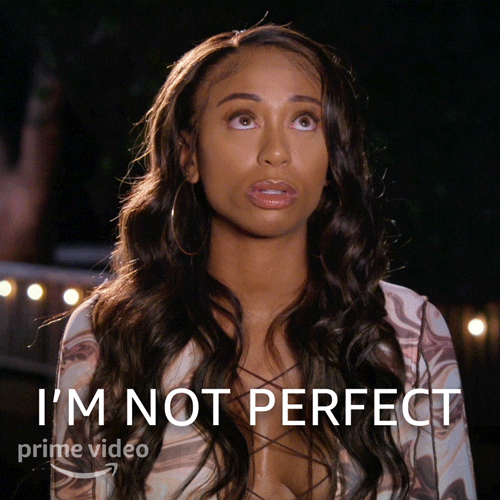 Giphy
GiphySooner than later, I’m going to write an article about forgiveness (beyond what I already have here). For now I’ll just say that if you are someone who thinks that other people don’t deserve forgiveness? That is either your pain or your ego talking and, either way, you can’t trust “their” judgment.
All of us mess up sometimes and if you are a karma (or you reap what you sow) believer, then you absolutely should want to extend others grace and mercy so that you can receive it in your own time of need (and you are absolutely delusional if you think a time won’t come, sooner than you probably think, that you will need it).
Besides, do you know all of the self-inflicted drama and trauma that comes from NOT forgiving others: higher blood pressure, insomnia, stress, anxiety, the higher risk of a heart attack, a weakened immunity, a greater risk for depression and anxiety — whatever he did, is it really worth all of this? Yeah, while a lot of people think that weaponizing forgiveness is empowering, really all it’s doing is putting themselves in harm’s way. Physically. Emotionally. SPIRITUALLY: “For if you forgive men their trespasses, your heavenly Father will also forgive you. But if you do not forgive men their trespasses, neither will your Father forgive your trespasses." (Matthew 6:14-15 — NKJV)
By the way, no one is saying that forgiving that man means that you have to allow him back into your life. After all, access is a privilege. Yet if he comes to you and acknowledges that he feels sorry for some things, for the sake of your own sanity, why not let him express it? Don’t wanna meet up or talk on the phone? Understood. Email and/or text are there for the taking. Don’t want to go back and forth? Who said that it needs to be a discussion or a debate?
All I know is, the more time you spend on this planet, the more you want to put out the energy that you want to come back. Forgiving others tends to make life easier. Not forgiving? Oh, the way that it boomerangs, sometimes in ways you never saw coming, chile. Dodge that kind of experience (and typically hard life lesson) if you can.
Yes, Better Late than Never
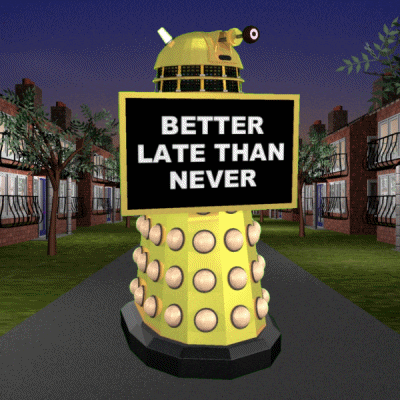 Giphy
GiphyToo late to apologize. Yeah, I don’t really know if there is such a thing (because forgiving and reconciling are not one in the same and some of y’all will catch that later). I’ll wrap this up with a story to prove my point.
Once upon a time, I knew a woman who was in a serious relationship and yet, whenever her boyfriend would bring up the possibility of marriage, she would stall him out. When I finally asked her what her deal was, she explained that she still harbored so much pain from the man before him that she didn’t fully trust that he was the real deal. About five months later, here came her ex with a thorough explanation for why he made some of the decisions that he did while they were together. Now that she had the full story, she was able to heal. She got married to her boyfriend that following year.
You see where I am going with this? Although your ex’s apology might be “late” as far as y’all’s relationship timeline, the timing may be BRILLIANT when it comes to true when and why you actually need it. Yeah, a Scripture that I adore is “Timing is the Father’s business” (Acts 1:7 — Message) and sometimes those apologies, in the grand scheme of things, are more on time than you could ever imagine; they’re when God deems you need them not when you want to have them.
____
It is Oprah Winfrey who once said, “True forgiveness is when you can say, "Thank you for that experience” and sis, if you remove the bitterness and anger and look deeper, there were valuable lessons, even in and from the most challenging relationships. And that is worth appreciating through forgiveness and, if need be, full and complete release.
Bottom line, should you accept an ex’s late apology? Absolutely.
What better way to illuminate your present on a whole ‘nother level.
Just as forgiveness always does.
TRUST ME.
Let’s make things inbox official! Sign up for the xoNecole newsletter for love, wellness, career, and exclusive content delivered straight to your inbox.
Featured image by Shutterstock






